
The World Economic Forum (WEF) is an international non-governmental and lobbying organisation based in Cologny, Canton of Geneva, Switzerland. It was founded on 24 January 1971 by German engineer Klaus Schwab. The foundation, which is mostly funded by its 1,000 member companies – typically global enterprises with more than US$5 billion in turnover – as well as public subsidies, views its own mission as "improving the state of the world by engaging business, political, academic, and other leaders of society to shape global, regional, and industry agendas".

Arkhip Ivanovich Kuindzhi or Arkhyp Kuindzhi was a landscape painter from the Russian Empire. Kuindzhi was one of the best friends of Russian chemist Dmitry Mendeleev with whom he collaborated on color studies.
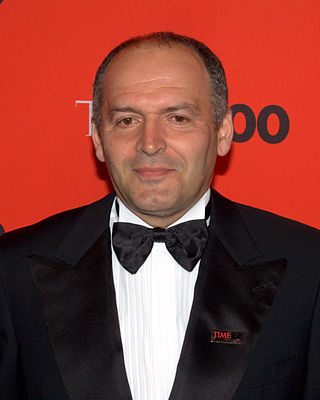
Victor Mykhailovych Pinchuk is a Ukrainian businessman and oligarch. As of January 2016, Forbes ranked him as 1,250th on the list of wealthiest people in the world, with a fortune of US$1.44 billion.
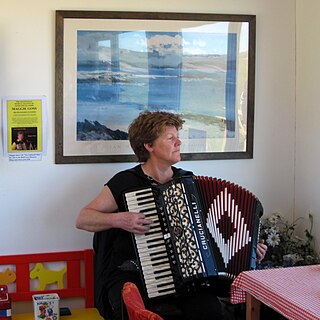
The culture of the Falkland Islands is essentially analogous to that of British culture. The Falkland Islands have a large non-native born population, mainly white and from England, but also from Saint Helena.
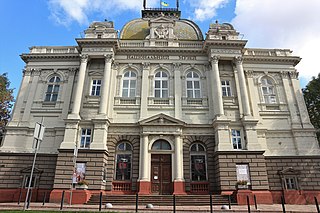
The Andrey Sheptytsky National Museum of Lviv is one of Ukraine's largest museums, dedicated to Ukrainian culture in all its manifestations. It was established by Metropolitan Archbishop Andrey Sheptytsky in 1905 and was originally known as the Lwow Ecclesiastical Museum. It currently bears Sheptytsky's name.

India Art Fair, previously known as India Art Summit founded by Sunil Gautam, is an annual Indian modern and contemporary art fair held in New Delhi, India. The fair includes paintings, sculptures, photography, mixed media, prints, drawings and video art. The first three editions of the fair were organized at Pragati Maidan, one of India's largest and oldest exhibitions grounds. Starting from the 4th edition, the venue was shifted to NSIC grounds, Okhla. First held in 2008, it is India's largest art fair. The art fair includes several pavilions of exhibits by galleries and solo projects by several artists. It also has an art education series with guided walks conducted by curators and students of art history. Simultaneously, there is a speakers' forum with panel of Indian and international experts from the art domain to discuss issues pertaining to the art in the region. It focuses on key issues related with the art production, art market and its reception in India.

The St. Petersburg International Economic Forum is an annual Russian business event for the economic sector, which has been held in St. Petersburg since 1997, and under the auspices of the Russian President since 2006. Each year, more than 10,000 people from over 120 different countries take part. The Forum brings together the chief executives of major Russian and international companies, heads of state, political leaders, prime ministers, deputy prime ministers, departmental ministers, and governors.

Borys Voznytsky Lviv National Art Gallery is the largest art museum in Ukraine, with over 62,000 artworks in its collection, including works of Ukrainian, Polish, Italian, French, German, Dutch and Flemish, Spanish, Austrian and other European artists. The artwork is currently divided into three major collections, housed in the historic Lozynsky and Potocki Palaces, while the Gallery additionally has the charge of fifteen small museums and historical buildings in or close to Lviv.

Yuri Kosin was a Ukrainian photographer, lecturer, curator of exhibitions, and traveler. Kosin was a member of the National Society of Photo Artists of Ukraine, tutor and curator at the Independent Academy of the Photographic Arts of Ukraine, organizer and curator of the "Eksar" photo gallery, Ukraine. He was also a member of the "Kulturforum" association and the artistic studio "Kulturwerkstatt Trier", Germany. He was a permanent member of the TV Ukrainian program "Svoimi ochima" (eyewitness) dedicated to travel and tourism. Kosin was named one of the experts in photography criticism in Ukraine in expert poll conducted in 2011 and was a participant of the Ukrainian New Wave.

Olena Golub or Holub is a Ukrainian contemporary artist, media artist, digital artist, collage artist, painter, art historian, representative of Ukrainian New Wave, member of the National Union of Artists of Ukraine, and member of the HEAA. Her works have been exhibited internationally, including Germany, Netherlands, Belgium South Korea, Poland, and Austria. Museums with her art works include the National Art Museum of Ukraine, and Museum of Pannonhalma Archabbey, Hungary.

Russian war crimes since 1991 are the violations of the law of war, including the Hague Conventions of 1899 and 1907 and the Geneva Conventions, consisting of war crimes, crimes against humanity, and the crime of genocide, which the official armed and paramilitary forces of the Russian Federation have been accused of committing since the dissolution of the Soviet Union. This accusation also extends to the aiding and abetting of crimes which have been committed by quasi-states or puppet states which are armed and financed by Russia, including the Luhansk People's Republic and the Donetsk People's Republic. These war crimes have included murder, torture, terrorism, deportation or forced transfer, abduction, rape, looting, unlawful confinement, unlawful airstrikes or attacks against civilian objects, and wanton destruction.
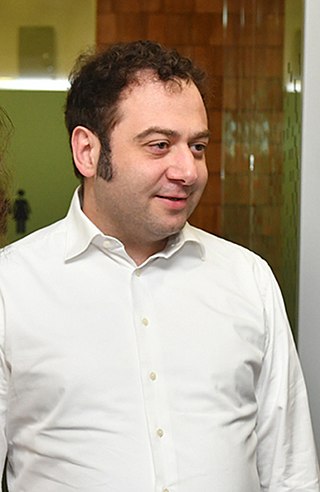
Tigran Oganesovich Khudaverdyan is a Russian businessman, former executive at Yandex N.V.

Since the beginning of the Russian invasion of Ukraine in 2022, Russian authorities and armed forces have committed multiple war crimes in the form of deliberate attacks against civilian targets, massacres of civilians, torture and rape of women and children, and indiscriminate attacks in densely populated areas.
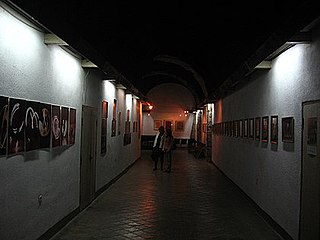
The Dzyga Art Center is an artistic association, including gallery, theater and concert facilities, in Lviv, Ukraine, that implements various ideas, projects and artistic actions. The wide range of activities launched at Dzyga includes: concerts, exhibitions, film screenings, photos, designs, texts, promos, and avant-garde revolutions.
There have been several rounds of peace talks to halt Russia's 2022 invasion in Ukraine and end the Russo-Ukrainian War in an armistice. The first meeting was held four days after the start of the invasion, on 28 February 2022, in Belarus. It concluded without result, with delegations from both sides returning to their capitals for consultations. A second and third round of talks took place on 3 and 7 March 2022, on the Belarus–Ukraine border, in an undisclosed location in the Gomel region of Belarus. A fourth and fifth round of talks were respectively held on 10 and 14 March in Istanbul, Turkey.

Russia began an invasion of Ukraine on 24 February 2022, in a major escalation of the Russo-Ukrainian War that began in 2014. It is the largest military attack in Europe since World War II. During the fighting, many pieces of Ukrainian cultural heritage were either destroyed, damaged, or put at risk due to the widespread destruction across the country. This deliberate destruction and looting of over 500 Ukrainian cultural heritage sites is considered a war crime and has been described by Ukraine's Minister of Culture as cultural genocide.

The Bucha massacre was the mass murder of Ukrainian civilians and prisoners of war by the Russian Armed Forces during the fight for and occupation of the city of Bucha as part of Russia's invasion of Ukraine. Photographic and video evidence of the massacre emerged on 1 April 2022 after Russian forces withdrew from the city.
Pritika Chowdhry is an Indian-born American artist, curator, and writer. She is known for her work in the socio-political domain.
False accusations of genocide in Donbas have been made by Russia against Ukraine since 2014. Russian propaganda has claimed that Ukrainian authorities have undertaken measures amidst the war in Donbas that amount to genocide against the Russian speakers of Ukraine. They have been cited by Russian president Vladimir Putin in support of the Russian invasion of Ukraine, a large-scale escalation of the Russo-Ukrainian War.
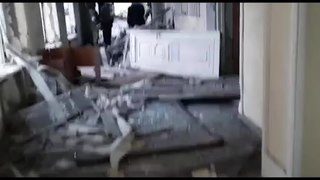
During the 2022 Russian invasion of Ukraine, Russian authorities and armed forces have committed war crimes by carrying out deliberate attacks against civilian targets and indiscriminate attacks in densely populated areas. The Russian military exposed the civilian population to unnecessary and disproportionate harm by using cluster munitions and by firing other explosive weapons with wide-area effects such as bombs, missiles, heavy artillery shells and multiple launch rockets.















